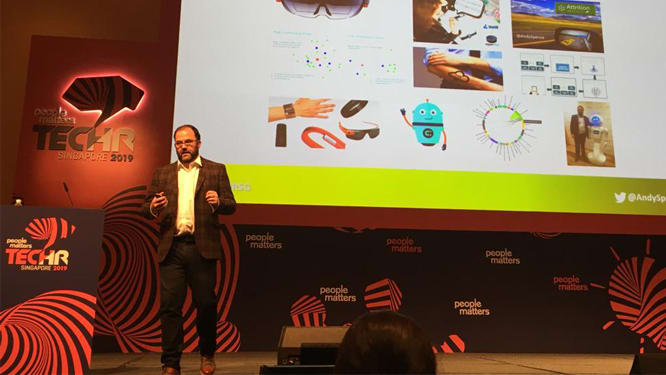Blockchain can be transformational for future of work: Andrew Spence

One of the emerging technologies that could be truly transformational for businesses is blockchain, says Andrew Spence, Faculty Member, The Blockchain Research Institute, in a deep dive session at TechHR Singapore 2019. “My passion is to make work better,” adds Andrew, who is an influencer in the HR tech space, “by leveraging technologies.” With the blockchain buzz started over the last few years and not many organizations are deploying the fully-baked solutions yet, some of the common questions persist, says Andrew. The most common of them include what it is and how does it help businesses? When are we likely to see the blockchain product being implemented for work? Having said, one pattern that Andrew saw in all these inquisitiveness is the ‘interest’ of people especially HR professionals to learn about this technology and use it to manage people better.
The technology called blockchain refers to a distributed, decentralized public ledger. The technology has the potential to disrupt much of what we do online and in the real world including traditional HR processes, adds Spence.
Blockchain and the word of work
There are several use cases of the technology in across sectors. Andrew referred to the blockchain-based platform developed by the Singapore Chamber of Commerce which was developed to facilitate the issuance of electronic certificates of origin. The goal of the blockchain platform is to help companies leverage the services of the chamber with flexibility and transparency.
Also Read: Broaden your network, learn, and experiment: Ester Martinez at TechHR 2019 Singapore
The real value this technology brings up is the decentralized business model that it helps generate, says Andrew. He says, while Internet helped exchange information, it’s time to move to the next level called the 'Internet of value’ which applies to any digital assets such as intellectual property. In the context of work, the technology has the potential to actually transform the world of work. Resumes and CV have been around for quite some time now which we create on MS Word and share through email. However, in today’s time, it’s important for an employer to know if he has the right guy in his nuclear power plant. It’s also equally important to safeguard our data on career history and other credentials. Citing the example of a BBC report which reported about the leak of a database containing resumes of more than 200 million Chinese people. Andrew e says technology like blockchain can help do away with such issue.
With the evolution of workforce technology, it is time look at new use cases and review traditional HR processes, says Spence.
Transforming HR with blockchain
Andrew says there are majorly four areas where blockchain can be used. The areas are credential verification, worker payments, work matching platforms, and identity management. The technology can help verify university degrees and courses one pursued. The technology can eventually help prove who you say you are. Over the last few decades, there has been a steady rise in global businesses and trade along with diaspora contributing to an increase in cross-border payments. Employers can leverage blockchain to offer near-instant cross-border payments at higher security and more reliability. So there is a big opportunity of streamlining the global process of remittances, says Spence. In fact, one of the banks in Australia is already using the technology to streamline the process of making payments. Spence also sees a rise in interest in blockchain research in leading innovation labs across the world. So, in coming days, new business models around digital work platforms will emerge which will be powered by blockchain. Even governments including the UK government are interested in this technology.
In the future, your CVs will look like Trustpilot IDs –ratings and references you carry around with you on your phone. You will have complete ownership of your reputation and proof of work experience, adds Spence.
The challenges
The opportunity brings with it some potential challenges, says Spence. And the top hurdles include the transaction cost, changing mindset --which according to him is the biggest challenge, and regulatory hurdles in different markets. There are also issues around transaction speed.
However, the longer term impact on HR is huge. Workplace tools will make employee supply and demand matching more seamless. Many traditional hiring tasks will be massively reduced. The tech will help many people management activities to be carried out by employees enabled by workforce technology.
Also Read: Create a 'Not-to-Do' list: Rudy Karsan on Career and Experience


